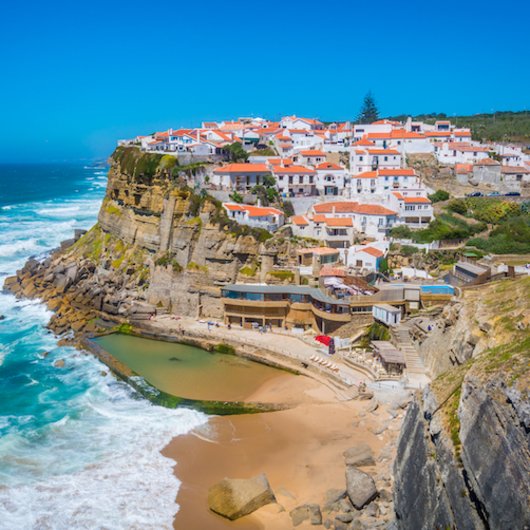Buying property in Portugal as a foreigner: 2025 guide
With its mild climate, captivating landscapes, and deep-rooted culture, Portugal is an ideal location for those contemplating a move abroad. This guide offers a comprehensive overview of the process, benefits, and considerations for buying property in Portugal as a foreigner.

Table of contents
- What is Portugal like?
- What are the current market trends in Portugal for 2025?
- What are the popular regions and areas to buy property in Portugal?
- Can non-EU citizens easily purchase property in Portugal?
- What is the step-by-step process for buying property in Portugal?
- How can I get a mortgage in Portugal?
- What are the pitfalls of buying property in Portugal?
- Download the complete guide for free
What is Portugal like?
Portugal occupies the western strip of the Iberian peninsula and is a member of the European Union, being one of its 27 countries. It is also part of the Eurozone nations.
The country's territories include:
- the mainland;
- the Madeira and Azores archipelagos in the Atlantic Ocean.
Portugal is organized into 18 districts on the mainland and two autonomous regions, Madeira and Azores, each with its own unique character and autonomy.
With a population of over 10 million people as of 2025, Portugal's rich cultural heritage and varied landscapes make it a fascinating location for investors and expats alike, offering opportunities for families looking to relocate and immerse themselves in a new, vibrant community.
Population distribution across Portugal's regions (scale 1-100)
Why invest in Portugal?
The country boasts more than 1,793 kilometers of coastline (1,114 miles) and enjoys a generous amount of sunshine throughout the year, especially in regions like the Algarve, which is famous for having over 300 days of sunshine per year.
As the fourth most visited country in Europe, Portugal experienced an unprecedented tourism boom in 2023, marking it as the best year for tourism in the country's history. The nation welcomed over 30 million visitors, generating around €25 billion ($26.8b) in tourism revenue (source: Governo de Portugal).
Tourism plays a vital role in the Portuguese economy, contributing to 8.1% of the GDP and having a significant impact on the construction industry.

What are the current market trends in Portugal for 2025?
As Portugal approaches 2025, several key trends are shaping its real estate market:
- Steady economic growth supporting property demand: Portugal's GDP is projected to grow by 1.8% in 2025, fostering a stable environment for real estate investments.
- Government initiatives to address housing affordability: In response to rising property prices, the government has launched a €2 billion package to build approximately 33,000 homes by 2030, aiming to alleviate the housing crisis. (source: Reuters).
- Sustained interest from foreign investors: Despite changes to programs like the Golden Visa, Portugal remains attractive to international buyers, particularly from the United States, contributing to increased demand in the property market.
- Regional disparities in property values: Major cities such as Lisbon and Porto continue to experience higher property prices, while emerging areas like the Silver Coast and Alentejo offer more affordable opportunities, attracting both investors and homebuyers seeking value.
Average cost of buying property in Portugal
As of 2025, the property market in Portugal shows a diverse range of prices across its most coveted areas and cities, reflecting the varied appeal of each location to both domestic and international buyers.
| City/Area | Cost in EUR per m² | Cost in USD per sq ft |
|---|---|---|
| Lisbon | €5,516 | $573 |
| Porto | €4,296 | $446 |
| Algarve | €3,533 | $367 |
| Albufeira (Algarve) | €3,604 | $374 |
| Braga | €1,507 | $157 |
| Coimbra | €2,221 | $231 |
While these figures provide a snapshot of the current market, property prices in Portugal can vary significantly based on the exact location, property type, and market conditions.
You can easily track the latest trends and price evolutions on our dedicated page:

What are the popular regions and areas to buy property in Portugal?
Portugal's scenic landscapes and rich culture provide a diverse range of regions for investment and living, each with its distinctive allure.
Popular regions for investment and living
- Algarve: Renowned for its stunning beaches, golf resorts, and sunny climate, the Algarve is a favorite among retirees and holidaymakers.
- Lisbon: As Portugal's capital and largest city, Lisbon offers a vibrant mix of traditional charm and modern conveniences, attracting both young professionals and families.
- Porto: Known for its rich history, Port wine, and distinctive architecture, Porto is becoming increasingly popular for its cultural vibrancy and robust real estate market.
- Madeira: Famed for its lush landscapes, mild climate, and outdoor activities, Madeira is ideal for those seeking a tranquil lifestyle.
- Silver Coast: The Silver Coast stretches from Lisbon to Porto and offers a less crowded alternative to the Algarve with its beautiful beaches, golf courses, and traditional towns.
- Alentejo: Known for its rolling plains and vineyards, Alentejo is perfect for those looking to escape to a quieter, more laid-back lifestyle.
Can non-EU citizens easily purchase property in Portugal?
Yes, non-EU citizens can purchase property in Portugal relatively easily. The process is quite straightforward and does not significantly differ from that for EU citizens.
Non-EU citizens need to obtain a Portuguese fiscal number (Número de Identificação Fiscal, NIF) from the Portuguese tax authority. This is required for all financial and legal transactions in Portugal, including property purchase.
Can I still obtain a Golden Visa through real estate investment in Portugal as of 2025?
As of 2025, significant changes have been made to Portugal's Golden Visa program concerning real estate investments.
The Golden Visa Program in Portugal is a legal pathway to obtain residency for non-EU/EEA citizens who make a significant investment in Portugal, which used include real estate investment. This program offers investors and their families the opportunity to live, work, and study in Portugal and provides a path to permanent residency and citizenship.
Initially, the program allowed significant leeway for real estate investments across the country, but updates have been introduced to redirect investment towards other areas of economic and social development.
As of the implementation of the "Mais Habitação Law", new applications for Golden Visas through real estate investments or real estate-related fund investments are no longer accepted.
What is the step-by-step process for buying property in Portugal?
Here’s a step-by-step guide to help you understand the process:
1. Research and plan
Determine whether the property is for investment, relocation, vacation, or retirement. Set a budget that includes purchase costs (like taxes and legal fees) and ongoing expenses (such as maintenance and property taxes).
2. Obtain a Portuguese Fiscal Number (NIF)
The NIF is essential for various transactions in Portugal, including buying property, opening a bank account, setting up utility services, and filing taxes.
If you are not residing in Portugal, you can authorize a representative to handle the process on your behalf. This representative needs to be a resident in Portugal and can be a lawyer or a tax representative.
You'll need:
- A passport or valid ID;
- proof of address: this can be a recent utility bill or a government-issued document indicating your residence address in your home country;
- power of attorney: if using a representative, a power of attorney document may be required.
To submit the application, you or your representative must visit a local tax office (Finanças) in Portugal. Some offices may require an appointment, which can be booked online. There is typically no fee for obtaining a NIF.
The NIF is usually issued immediately during your visit to the tax office or shortly thereafter.
3. Open a Portuguese bank account
Opening a bank account in Portugal is straightforward and can be done even as a non-resident.
You'll need:
- A passport or valid ID;
- Portuguese NIF;
- Proof of address;
- Proof of employment or income.
4. Start searching for properties
Explore online listings on Properstar to find properties for sale in your area of interest. You can leverage our advanced filters and even draw your preferred area on the map.
Consider hiring a real estate agent to gain better insights into the market and assistance in finding properties that meet your criteria and budget.

5. Find the right real estate agent
The right real estate agent can provide insights into the local market, assist in finding properties that meet your criteria, and navigate the negotiation process.
Here's how to ensure you pick the best professional for your needs:
- Local expertise: Look for agents with a deep understanding of the area you're interested in. They should be knowledgeable about local property trends, prices, and the unique aspects of the community.
- Language skills: If you're not fluent in Portuguese, finding an agent who can communicate effectively in your language is essential. They'll act as your liaison with sellers, lawyers, and other parties involved in the process.
- Experience and credentials: Check the agent's experience and qualifications. They should have a solid track record of assisting foreign buyers and be registered with a recognized real estate association in Portugal.
You can utilize Properstar's agent search feature to find reputable local real estate agents. Our platform offers access to a wide network of professionals vetted for their expertise and reliability, making finding someone who meets your specific needs easier.
6. Conduct property viewings
Visit potential properties to assess their condition, location, and suitability.
7. Legal checks and due diligence
The Land Registry (Conservatória do Registo Predial) is crucial to verify the property's legal status, ensuring it's free of debts, charges, or embargoes and that the seller holds the legal right to sell. This can be done by requesting a certidão permanente from the Land Registry.
Ensure the property complies with local zoning and urban planning laws. This is particularly important for new builds or rural properties, where there might be restrictions.
Although not a legal requirement, it's highly recommended to conduct a property survey to check the physical condition of the property. This can uncover potential issues with the building's structure, utilities, or land.
8. Make an offer
With the help of your real estate agent, make an offer on the property. If accepted, you'll proceed to the contract stage.
9. Sign the preliminary contract (Contrato-promessa de compra e venda)
This preliminary agreement between buyer and seller (contrato-promessa de compra e venda) secures the purchase and typically involves a deposit from the buyer (usually 10% of the purchase price). It specifies the sale's terms and conditions and commits both parties to the transaction.
If the buyer pulls out, they lose the deposit. If the seller pulls out, they must pay back double the deposit amount.
10. Finalize mortgage arrangements (if applicable)
Finalize the terms with your bank if you're financing the purchase through a mortgage.
11. Sign the deed of sale (Escritura de Compra e Venda)
The final step is signing the deed of sale (escritura de compra e venda) before a notary, transferring ownership. The buyer must pay the remaining purchase price and all associated taxes and fees at this time.
Both parties must present their identification, the NIF, proof of deposit payment, and any mortgage details, if applicable.
12. Register the property
After the deed is signed, the new owner must register the property at the local Land Registry. This step is essential for legal protection.
13. Pay associated taxes and fees
Buyers are responsible for paying property transfer tax (IMT) for resale properties or VAT (IVA) for new properties, plus stamp duty, notary fees, and registry fees. Depending on the region, the total cost can range from 6% to 8% of the purchase price.
Taxes for new properties
| Tax | Percentage |
|---|---|
| VAT (IVA) | 23% of the purchase price |
| Stamp Duty | 0.8% of the purchase price |
Taxes for resale properties
| Tax | Percentage |
|---|---|
| Transfer Tax (IMT) | Graduated scale up to 6%, depending on property value and location |
Additional costs
| Tax | Percentage |
|---|---|
| Notary fees | Around 0.5% to 1% of the purchase price |
| Land Registry fees | Between 0.2% and 0.8% |
| Legal fees | Typically around 1% of the purchase price |
Given the complexity of the process, it's advisable to hire a lawyer specialized in Portuguese property law. They can handle legal checks, negotiations, and paperwork, ensuring your rights are protected throughout the purchase.
Some valuable resources for official information include:
- Portuguese Ministry of Justice: For information on NIF application procedures for foreigners.
- Conservatória do Registo Predial (Land Registry): For checks on property legal status.
- Autoridade Tributária (Portuguese Tax Authority): For details on taxes related to property transactions.
- Instituto dos Registos e do Notariado: Offers insights into the property registration process.
14. Transfer utilities
Transfer utilities to your name and set up local services.

How can I get a mortgage in Portugal?
Many Portuguese banks like Millennium BCP, Banco BPI, and Caixa Geral de Depósitos offer mortgages to foreigners, though the terms may vary from those offered to residents.
Interest rates for mortgages in Portugal also fluctuate, with some banks providing competitive rates for non-residents. For instance, Caixa Geral de Depósitos advertises rates around 3.95%, while Banco BPI has been known to offer an effective rate of 3.25% for its customers. These rates are subject to change and depend on several factors, including the bank’s conditions and your financial history.
How to obtain a mortgage
To apply, you'll generally need a valid passport, proof of income, recent bank statements, a credit report from your country of residence, proof of your primary residence, and proof of deposit. Most Portuguese banks will accept documents in English.
The initial step involves contacting banks for mortgage pre-offers, which provide an outline of possible loan amounts and interest rates.
Ensure all required documentation for the property is complete and current, including property deeds and energy certificates.
Once the mortgage is sanctioned, the bank typically oversees the majority of the legal and administrative procedures.
Special considerations for non-residents
Non-residents usually can secure mortgages covering up to 80% of the property’s sale price or assessed value. This means you'll be required to pay at least a 20% down payment plus applicable taxes and fees.
The application process for non-residents requires more comprehensive documentation and differs slightly from that for residents. Additionally, mortgages for non-residents often feature higher interest rates than those for residents due to the increased risk associated with managing international defaults.
What are the pitfalls of buying property in Portugal?
Navigating the legal and bureaucratic aspects of purchasing property in Portugal can be challenging, especially for those unfamiliar with the local system. The country's legal requirements around property transactions involve various steps, including obtaining a fiscal number, opening a local bank account, and understanding complex tax implications, which can vary depending on your residency status.
Another significant concern is the issue of property rights and titles. Some properties, especially older ones and those in rural areas, may have unclear titles or unresolved ownership issues. These can lead to prolonged legal disputes or additional costs, as buyers might need to rectify these issues post-purchase.
The condition of the property is also a crucial factor. Some properties may appear a good deal but require extensive and costly renovations to meet living standards or regulatory requirements. The cost of renovation in Portugal can quickly add up, particularly in remote areas or historic properties subject to stricter renovation rules.
Furthermore, market understanding is vital. The Portuguese real estate market varies significantly between regions. Urban areas like Lisbon and Porto have seen prices rise substantially, driven by foreign investment and tourism. In contrast, rural areas might offer lower prices but also come with less liquidity, making it harder to resell the property later.
Navigating these pitfalls often requires thorough research, professional advice, and a clear understanding of one's long-term objectives when purchasing property in Portugal.
Frequently asked questions about property purchases in Portugal
No, you do not need to be a resident to buy property in Portugal. Foreigners can purchase property without any special restrictions.
It is crucial to have a lawyer who can check property documentation for any encumbrances, liens, or zoning issues to ensure there are no legal problems.
Yes, you can rent out your property. Rental income from Portuguese property is taxable, but Portugal offers favorable tax treatment for non-resident landlords under certain conditions.
Download the complete guide for free
Ready to turn your dream of owning property in Portugal into reality? Our comprehensive guide, "How to Buy Property in Portugal," is your essential resource for confidently navigating the Portuguese real estate market.
Fill out the form below and download your copy now.







